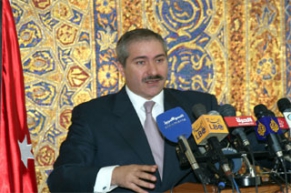|
World Jewish News

Nasser Judeh (photo by jordanembassy.nl)
|
Jordan arrests suspect in attack on Israeli convoy
15.01.2010, Israel and the World Jordanian authorities arrested overnight Thursday in Amman a taxi driver suspected of involvement in Thursday's bomb attack on an Israeli embassy convoy in Jordan, Arabic-language news network Al-Arabiya reported.
Jordan's Foreign Minister Nasser Judeh called Israel's ambassador to Jordan Daniel Nevo on Thursday after a roadside explosive device went off near a convoy of cars carrying three Israeli diplomats traveling from Jordan toward Israeli earlier.
The blast occurred at around 6 p.m. close to the Allenby Bridge crossing between Jordan and the West Bank. No one was hurt.
Judeh stressed in his conversation with the Israeli ambassador that Jordanian authorities were investigating the incident and that every effort was being made to apprehend the perpetrators of the attack as soon as possible.
Israel's Foreign Ministry emphasized that Nevo was not in the convoy, and was never in any danger.
Thursday's bombing was the first time a roadside explosive device was used in an attack in Jordan, where suicide bombings and shootings have targeted foreigners in recent years. The method is widespread in neighboring Iraq.
The sundown attack also exposed a security breach for Israeli diplomats, who are usually escorted by security personnel from both countries and use different routes and departure times during their occasional travels in Jordan.
The explosion ripped through the right side of a curvy road cutting through hilly villages on the western outskirts of the capital, Amman. The blast left a large hole about 3 feet deep and damaged a highway guardrail.
Jordanian forensic officers were inspecting the site of the attack, a security official said. The area is halfway from the Allenby Bridge over the Jordan River, which links Jordan with the West Bank.
Israel and Jordan, which signed a peace treaty in 1994, maintain close security cooperation and cordial diplomatic ties.
But anti-Israeli sentiments have been running high as the Israel-Palestinian conflict drags on without a solution. A significant portion of Jordan's population is made up of Palestinians.
Police were trying to determine the size and complexity of the bomb, which appears to have been detonated remotely, the official said, insisting on anonymity because he is not allowed to release details during early stages of investigation.
Israeli media reported that one the timing of the remote-controlled detonation was off and the vehicles were not seriously damaged. The convoy later crossed the bridge to Israel.
The section of road, which is less monitored than the area closer to the bridge, is used by tourists and other travelers visiting the Dead Sea.
After the explosion, the convoy entered a small Jordanian army post as soldiers searched the area, Channel 2 reported.
Jordanian police sealed off the main road leading to the area, sending large numbers of firefighters, police and ambulances to the scene.
Information Minister Nabil Sharif said in a brief statement that an explosive device went off on the side of the road leading to the Jordan Valley as some civilian vehicles were passing by, including two Israeli diplomatic cars.
He said there were no injuries, and authorities have launched an investigation.
Two Jordanian security officials said the attackers may have thought that the Israeli ambassador to Jordan was in the convoy.
In Amman, Israeli Embassy spokeswoman Merav Horsandi confirmed there was a blast next to a convoy carrying embassy employees. "All I can say now is that everyone is fine," she said.
In Jerusalem, Israeli officials said four passengers and two security guards were in the convoy and they were heading to Israel for the weekend.
There have been several attempted attacks on Israeli citizens in Jordan in past years.
In 2001, Israeli jeweler Yitzhak Shnir, 51, was gunned down in Amman. An unknown group claimed responsibility, saying Shnir was an Israeli spy.
In 2005, al-Qaida in Iraq said after its triple hotel blasts in Amman that one of the targets included a hotel known to be patronized by Israelis.
Officials have warned of likely terror attacks against Israeli targets abroad for some time, with Hezbollah thought to seek revenge for the assassination of its deputy chief Imad Mughniyeh in 2008. Though Israel has denied any involvement in the assassination, the Lebanese militia has repeatedly accused Israel of orchestrating the Damascus bombing that killed Mughniyeh, and has vowed to avenge his death.
Over recent years, several attempts have been made to harm Israeli diplomats around the world, notably in an attempt to blow up the Israeli embassy in the Azerbaijani capital of Baku a year ago
Haaretz
|
|
